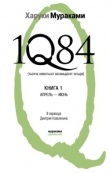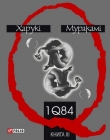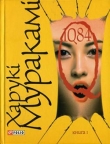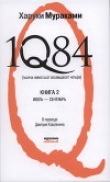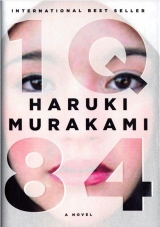
Текст книги "1q84"
Автор книги: Haruki Murakami
Жанр:
Современная проза
сообщить о нарушении
Текущая страница: 29 (всего у книги 81 страниц)
“Our researchers are eager and capable. They choose a number of candidates and examine them from every angle. Probably a few people around you know that you are writing a novel. Word gets out …”
Komatsu knew he was writing a novel, and so did his older girlfriend. Was there anyone else? Probably not.
“I’d like to ask a few things about your foundation,” Tengo said.
“Please do. Ask anything at all.”
“Where does it get the money it needs to operate?”
“From a certain individual. Or, you might say, from an organization of his. Realistically speaking—just between us—it also serves as one of his many tax write-offs. Of course, quite aside from that, this individual has a deep interest in scholarship and the arts, and he wants to support members of the younger generation. I can’t go into any more detail here. The person wishes to remain anonymous—and that includes his organization as well. All day-to-day operations are entrusted to the foundation’s committee, of which yours truly is, for now, a member.”
Tengo thought about this for a moment, but there really wasn’t that much to think about. All he did was put the things that Ushikawa had told him in order.
“Would you mind very much if I smoked?” Ushikawa asked.
“Not at all,” Tengo said, pushing a heavy glass ashtray in his direction.
Ushikawa took a box of Seven Stars cigarettes from his breast pocket, put a cigarette in his mouth, and lit it with a gold lighter. The lighter was slim and expensive-looking.
“So, what do you say, Mr. Kawana?” Ushikawa asked. “Will you do us the honor of accepting our grant? Speaking for myself, quite honestly, after having heard your delightful lecture, I am very much looking forward to seeing what kind of world you go on to create in your literature.”
“I am very grateful to you for bringing me this offer,” Tengo said. “It’s far more than I deserve. But I’m afraid I can’t accept it.”
Smoke rose from the cigarette between Ushikawa’s fingers. He looked at Tengo with his eyes narrowed. “By which you mean …?”
“First of all, I don’t like the idea of taking money from people I hardly know. Secondly, as things stand now, I don’t really need the money. I have managed well enough so far by teaching three days a week at the cram school and using the other days to concentrate on my writing. I’m not ready to change that lifestyle.”
Thirdly, Mr. Ushikawa, I personally don’t want to have anything to do with you. Fourthly, no matter how you look at it, there’s something fishy about this grant. It just sounds too good to be true. There’s something going on behind the scenes. I certainly don’t have the best intuition in the world, but I can tell that much from the smell. Tengo, of course, said none of this.
“I see,” Ushikawa said, filling his lungs with cigarette smoke and exhaling with a look of deep satisfaction. “I see. I think, in my own way, I understand your view of the matter. What you say is quite logical. But really, Mr. Kawana, there is no need for you to give me your answer right now. Why don’t you go home and take a good two or three days to think it over? Take more time to reach your conclusion. We’re not in any hurry. It’s not a bad offer.”
Tengo gave his head a decisive shake. “Thank you, that’s very kind, but it will save us both a lot of time and trouble if we reach a final decision today. I am honored to have been nominated for a grant, and I’m sorry to have put you to the trouble of making a special trip here, but I’m afraid I will have to decline. This is my final conclusion, and there is no possibility that I would reconsider.”
Ushikawa nodded a few times and regretfully used the ashtray to crush out the cigarette, from which he had taken only two puffs.
“That’s fine, Mr. Kawana. I see where you are coming from, and I want to respect your wishes. I am sorry for having taken up your time. It’s unfortunate, but I will have to resign myself to it. I will be going now.”
But Ushikawa showed no sign of standing up. He simply treated the back of his head to a thorough scratching and looked at Tengo with narrowed eyes.
“However, Mr. Kawana, you yourself may not be aware of it, but people are expecting great things from you as a writer. You have talent. Mathematics and literature probably have no direct connection, but listening to you lecture on mathematics is like listening to someone tell a story. This is not something that any ordinary person can do. You have something special that needs to be told. That is clear even to the likes of me. So be sure to take care of yourself. Forgive me if I am being oversolicitous, but please try not to become embroiled in extraneous matters, and make up your mind to walk straight down your own path in life.”
“Extraneous matters?” Tengo asked.
“For example, you seem to have—how should I put this?—some sort of connection with Miss Eriko Fukada, the author of Air Chrysalis. Or at least you have met her a few times, am I correct? By coincidence, I just happened to read in today’s paper that she has apparently disappeared. The media will have a field day with this delicious item, I’m sure.”
“Assuming I have met Eriko Fukada, is that supposed to mean something?”
Again Ushikawa raised his hand to stop Tengo. It was a small hand, but the fingers were short and stubby. “Now, now, please don’t get worked up over this. I don’t mean any harm. All I am trying to say is that selling off one’s talents and time in dribs and drabs to make ends meet never produces good results. It may sound presumptuous of me to say this, but your talent is a genuine diamond in the rough, and I don’t want to see it wasted and ruined on pointless things. If the relationship between you and Miss Fukada becomes public knowledge, Mr. Kawana, someone is bound to seek you out at home. They’ll start stalking you, and they’ll turn up all kinds of half-truths. They’re a persistent bunch.”
Tengo stared at Ushikawa, saying nothing. Ushikawa narrowed his eyes and started scratching one of his big earlobes. The ears themselves were small, but Ushikawa’s earlobes were strangely big. Ushikawa’s physical oddities were an unending source of fascination.
“Now, don’t get the wrong idea. My lips are sealed,” Ushikawa said, gesturing as if zipping his mouth closed. “I promise you that. I may not look it, but I know how to keep a secret. People say I must have been a clam in a previous life. I’ll keep this matter locked up inside as a sign of my personal regard for you. No one else will know.”
Finally he stood up and made several attempts to smooth out the tiny wrinkles in his suit but succeeded only in making them more obvious.
“If you should change your mind about the grant, please call the number on my card whenever you feel like it. There is still plenty of time. If this year is no good for you, well, there’s always next year.” With raised index fingers, Ushikawa mimed the earth revolving around the sun. “We are in no hurry. At least I succeeded in meeting you and having this little talk with you, and I believe that you have gotten our message.”
After one more smile, all but flaunting his ruined dentition, Ushikawa turned and left the reception room.
Tengo used the time until his next class to think through Ushikawa’s remarks in his head. The man seemed to know that Tengo had participated in the rewrite of Air Chrysalis. There were hints of it everywhere in his speech. All I am trying to say is that selling off one’s talents and time in dribs and drabs to make ends meet never produces good results, Ushikawa had said pointedly.
“We know”—surely, that was the message.
I succeeded in meeting you and having this little talk with you, and I believe that you have gottenourmessage.
Could they have dispatched Ushikawa to see Tengo and offer him the three-million-yen grant for no other purpose than to deliver this message? No, it didn’t make sense. There was no need for them to devise such an elaborate plot. They already knew where he was weakest. If they had wanted to threaten Tengo, all they had to do was bring out the facts. Or were they trying to buy him off with the grant? It was all too dramatic. And who were “they” after all? Was the New Japan Foundation for the Advancement of Scholarship and the Arts connected with Sakigake? Did it even exist?
Tengo went to see the secretary, carrying Ushikawa’s business card. “I need to ask you to do me another favor,” he said.
“What would that be?” she asked, remaining seated at her desk and looking up at Tengo.
“I’d like you to call this number and ask if they’re the New Japan Foundation for the Advancement of Scholarship and the Arts. Also, ask whether this director, Mr. Ushikawa, is in. They’ll probably say he’s not there, so ask when he’s due back in the office. If they ask your name, just make something up. I’d do it myself, except it might be a problem if they recognize my voice.”
The secretary dialed the numbers and a standard back-and-forth ensued—a concise exchange between two professionals. When it ended, the secretary reported to Tengo, “The New Japan Foundation for the Advancement of Scholarship and the Arts does exist. A woman answered, probably in her early twenties, a normal receptionist. Mr. Ushikawa actually works there. He’s supposed to be back around three thirty. She didn’t ask my name—which I certainly would have done.”
“Of course,” Tengo said. “Anyhow, thanks.”
“You’re welcome,” she said, handing Ushikawa’s card back to Tengo. “Is this Mr. Ushikawa the person who came to see you?”
“That’s him.”
“I barely looked at him, but he seemed kind of creepy.”
Tengo put the card into his wallet. “I suspect that impression wouldn’t change even if you had more time to look at him,” he said.
“I always tell myself not to judge people by their appearance. I’ve been wrong in the past and had some serious regrets. But the minute I saw this man, I got the feeling he couldn’t be trusted. I still feel that way.”
“You’re not alone,” Tengo said.
“I’m not alone,” she echoed, as if to confirm the grammatical accuracy of Tengo’s sentence.
“That’s a beautiful jacket you’re wearing,” Tengo said, meaning it quite honestly. He wasn’t just flattering her. After Ushikawa’s crumpled heap of a suit, her stylishly cut linen jacket looked like a lovely piece of fabric that had descended from heaven on a windless afternoon.
“Thank you,” she said.
“But just because somebody answered the phone, it doesn’t necessarily mean that the New Japan Foundation for the Advancement of Scholarship and the Arts actually exists.”
“That’s true. It could be an elaborate ruse. You just have to put in a phone line and hire somebody to answer it. Like in The Sting. But why would they go to all that trouble? Forgive me, Tengo, but you don’t look like somebody who’d have enough money to squeeze out of you.”
“I don’t have a thing,” Tengo said, “except my soul.”
“Sounds like a job for Mephistopheles,” she said.
“Maybe I should walk over to this address and see if there’s really an office there.”
“Tell me what you find out,” she said, inspecting her manicure with narrowed eyes.
The New Japan Foundation for the Advancement of Scholarship and the Arts actually existed. After class, Tengo took the subway to Yotsuya and walked to Kojimachi. At the address on Ushikawa’s card he found a four-story building with a metal nameplate by the front entrance: “New Japan Foundation for the Advancement of Scholarship and the Arts.” The office was on the third floor. Also on that floor were Mikimoto Music Publishers and Koda Accountants. Judging from the scale of the building, none of them could be very big offices. None appeared to be flourishing, either, though their true condition was impossible to judge from outside. Tengo considered taking the elevator to the third floor. He wanted to see what kind of office it was, or at least what its door looked like. But things could prove awkward if he ran into Ushikawa in the hallway.
Tengo took another subway home and called Komatsu’s office. For a change, Komatsu was in, and he came to the phone right away.
“I can’t talk now,” Komatsu said, speaking more quickly than usual, his tone of voice somewhat higher than normal. “Sorry, but I don’t think I can talk about anything here right now.”
“This is very important,” Tengo said. “A very strange guy came to see me at school today. He seemed to know something about my connection with Air Chrysalis.”
Komatsu went silent for a few seconds at his end. “I think I can call you in twenty minutes. Are you at home?”
Tengo said that he was. Komatsu hung up. While he waited for Komatsu to call, Tengo sharpened two kitchen knives on a whetstone, boiled water, and poured himself some tea. The phone rang exactly twenty minutes later, which was again unusual for Komatsu.
This time Komatsu sounded far calmer than he had before. He seemed to be phoning from a quieter place. Tengo gave him a condensed account of what Ushikawa had said in the reception room.
“The New Japan Foundation for the Advancement of Scholarship and the Arts? Never heard of it. And that three-million-yen grant for you is hard to figure, too. I agree, of course, that you have a great future as a writer, but you still haven’t published anything. It’s kind of incredible. They’ve got some ulterior motive.”
“That’s what I thought.”
“Give me a little time. I’ll find out what I can about this New Japan Foundation for the Advancement of Scholarship and the Arts. I’ll get in touch with you if I learn anything. But this Ushikawa guy knows you’re connected with Fuka-Eri, huh?”
“Looks that way.”
“That’s a bit of a problem.”
“Something’s starting to happen,” Tengo said. “It’s fine that Professor Ebisuno managed to pry up his rock, but some kind of monster seems to have crawled out from underneath.”
Komatsu sighed into the phone. “It’s coming after me, too. The weekly magazines are going crazy. And the TV guys are poking around. This morning the cops came to the office to question me. They’ve already latched on to the connection between Fuka-Eri and Sakigake. And of course the disappearance of her parents. The media will start blowing up that angle soon.”
“What’s Professor Ebisuno doing?”
“Nobody’s been able to get in touch with him for a while. Phone calls don’t go through, and he doesn’t get in touch with anybody. He may be having a tough time too. Or he could be working on another secret plan.”
“Oh, by the way, to change the subject a bit, have you told anybody that I’m writing a long novel?” Tengo asked Komatsu.
“No, nobody,” Komatsu responded immediately. “Why would I tell anyone about that?”
“That’s okay, then. Just asking.”
Komatsu fell silent for a moment, and then he said, “It’s kind of late for me to be saying this, but we might have gotten ourselves into nasty territory.”
“Whatever we’ve gotten ourselves into, there’s no backing out now, that’s for sure.”
“And if we can’t back out, all we can do is keep going forward, even if you’re right about that monster.”
“Better fasten your seat belt,” Tengo said.
“You said it,” Komatsu said, and hung up.
It had been a long day. Tengo sat at the kitchen table, drinking his cold tea and thinking about Fuka-Eri. What could she be doing all day, locked up alone in her hiding place? Of course, no one ever knew what Fuka-Eri was doing.
In her recorded message, Fuka-Eri had said that the Little People’s wisdom and power might cause harm to the Professor and to Tengo. Better be careful in the forest. Tengo found himself looking at his surroundings. True, the forest was their world.
CHAPTER 3
Aomame
YOU CAN’T CHOOSE HOW YOU’RE BORN,
BUT YOU CAN CHOOSE HOW YOU DIE
One night near the end of July, the thick clouds that had long covered the sky finally cleared, revealing two moons. Aomame stood on her apartment’s small balcony, looking at the sky. She wanted to call someone right away and say, “Can you do me a favor? Stick your head out the window and look at the sky. Okay, how many moons do you see up there? Where I am, I can see two very clearly. How about where you are?”
But she had no one to whom she could make such a call. Ayumi was one possibility, but Aomame preferred not to further deepen their personal relationship. She was a policewoman, after all. Aomame would more than likely be killing another man before long, after which she would change her face, change her name, move to a different area, and disappear. Obviously, she wouldn’t be able to see or contact Ayumi anymore. Once you let yourself grow close to someone, cutting the ties could be painful.
She went back inside, closed the balcony door, and turned on the air conditioner. Then she drew the curtains to place a barrier between herself and the moons. The two moons in the sky were disturbing to her. They subtly disrupted the balance of the earth’s gravity, and they seemed to be affecting her physically as well. Her period was not due for a while, but her body felt strangely listless and heavy. Her skin was dry, and her pulse abnormal. She told herself not to think about the moons anymore—even if they were something that she ought to think about.
To combat the listlessness, Aomame lay on the carpet to stretch her muscles, systematically engaging one muscle after another that she had little chance to use on a daily basis, and stretching it as far as it would go. Each muscle responded with wordless screams, and her sweat rained down on the floor. She had devised this stretching program herself and modified it each day, making it increasingly radical and effective. It was strictly for her own use. She could not have introduced it into her sports club classes. Ordinary people could never bear that much pain. Most of her fellow instructors screamed for mercy when she tried it on them.
While going through her program, she played a recording of Janáček’s Sinfonietta conducted by George Szell. The music took twenty-five minutes to play, which was the right amount of time to effectively torture every muscle in her body—neither too short nor too long. By the time the music ended, the turntable stopped, and the automatic tonearm returned to its rest, both her mind and her body felt like rags that had been thoroughly wrung out.
By now, Aomame had memorized every note of Sinfonietta. Listening to the music while stretching her body close to its limit, she was able to attain a mysterious calm. She was simultaneously the torturer and the tortured, the forcer and the forced. This sense of inner-directed self-sufficiency was what she wanted most of all. It gave her deep solace. Janáček’s Sinfonietta was effective background music for that purpose.
Just before ten o’clock that night, the phone rang. Lifting the receiver, she heard Tamaru’s voice.
“Any plans for tomorrow?”
“I get out of work at six thirty.”
“Think you can stop by after that?”
“I’m sure I can,” Aomame said.
“Good,” Tamaru said. She could hear his ballpoint pen writing on his calendar.
“Have you found a new dog yet?” Aomame asked.
“Dog? Uh-huh. Another female German shepherd. I still don’t know everything about her disposition, but she’s been trained in the basics and she seems to obey commands. She arrived about ten days ago and is pretty well settled in. The women are relieved to have a dog again.”
“That’s good.”
“This one’s satisfied with ordinary dog food. Less bother.”
“Ordinary German shepherds don’t eat spinach.”
“That was one strange dog. And depending on the season, spinach can be expensive,” Tamaru complained nostalgically. After a few seconds’ pause, he added, “It’s a nice night for moon viewing.”
Aomame frowned slightly into the phone. “Where did that come from all of a sudden?”
“Even I am not unaware of natural beauty, I’ll have you know.”
“No, of course not,” Aomame said. But you’re not the type to discuss poetic subjects on the phone without some particular reason, either.
After another short silence at his end, Tamaru said, “You’re the one who brought up moon viewing the last time we talked on the phone, remember? I’ve been thinking about it ever since, especially when I looked up at the sky a little while ago and it was so clear—not a cloud anywhere.”
Aomame was on the verge of asking him how many moons he had seen in that clear sky, but she stopped herself. It was too fraught with danger. Tamaru had told her about his life last time—about having been raised as an orphan who never knew his parents’ faces, about his nationality. He had never spoken at such length before, but he was not a man much given to talking about himself in any case. He had taken a personal liking to Aomame and had more or less opened himself up to her. But ultimately, he was a professional, trained to take the shortest route to see his mission through. There was no point in saying too much to him.
“I think I can get there around seven o’clock tomorrow night after work,” she said.
“Fine,” Tamaru said. “You’ll probably be hungry. The cook is off tomorrow, so we can’t serve you anything decent, but if a sandwich or something is all right with you, I can do the preparations.”
“Thanks,” Aomame said.
“You’ll be needing your driver’s license, your passport, and your health insurance card. We’d like you to bring those tomorrow. Plus, we’d like a copy of your apartment key. Can you have all those ready for us?”
“Yes, I think so.”
“And one more thing. I’d like to see you alone about that business from before. So keep some time open for me after you’re through with Madame.”
“Business from before?”
Tamaru fell silent for a moment. His silence had all the weight of a sandbag. “I believe there was something you wanted to get ahold of. Have you forgotten?”
“No, of course I remember,” Aomame hurried to say. In a corner of her mind, she had still been thinking about the moons.
“Tomorrow at seven, then,” Tamaru said and hung up.
The number of moons had not changed the following night. When she took a quick shower after work and left the club, two pale-colored moons had already appeared side by side in the still-bright sky. Aomame stood on the pedestrian footbridge spanning Gaien-nishi Dori Avenue, leaning against the handrail and gazing at the two moons for a time. No one else made a point of looking at the moons like this. The people passing by did no more than cast puzzled glances in Aomame’s direction as she stood there looking up at the sky. They hurried toward the subway station as if they had absolutely no interest in either the sky or the moon. As she gazed upward, Aomame began to feel the same physical lassitude she had experienced the day before. I have to stop staring at the moons like this, she told herself. It can’t have a good effect on me. But try as she might not to look at the moons, she could not help feeling their gaze against her skin. Even if I don’t look at them, they’re looking at me. They know what I’m about to do.
Using ornate cups from a bygone era, the dowager and Aomame drank thick hot coffee. The dowager dribbled in a little milk at the edge of her cup and drank the coffee without stirring it. She used no sugar. Aomame drank hers black, as usual. Tamaru served them the sandwiches he had promised. He had cut them into bite-sized pieces. Aomame ate several. They were simple cucumber and cheese sandwiches on brown bread, but were subtly flavored. Tamaru had a fine touch in making such simple dishes, wielding a kitchen knife with skill, cutting each of his ingredients to the perfect size and thickness. He knew the proper order with which to undertake each task. This was all it took to make an amazing difference in how things tasted.
“Have you finished organizing your things?” the dowager asked.
“I donated my extra clothing and books to charity. I’ve packed a bag with everything I’ll need in my new life, ready to go at any time. The only things left in my apartment are the basics I’ll need for the time being: electrical appliances, cookware, bed and bedding, a few dishes.”
“We’ll take care of anything that’s left. And you don’t have to think about your lease or other such details. You can just walk out with the few things you really need in your luggage.”
“Should I let them know at work? It could raise suspicions if I suddenly disappeared one day.”
The dowager quietly returned her coffee cup to the table. “You don’t have to think about that, either.”
Aomame responded with a nod. She ate another sandwich and took a sip of coffee.
“By the way, do you have money in the bank?” the dowager asked. “I have six hundred thousand yen in a regular savings account and two million yen in a CD.”
The dowager did some calculations. “There’s no problem with your withdrawing up to four hundred thousand yen from the savings account if you do it in stages, but don’t touch the CD. It wouldn’t be a good idea for you to cancel it all of a sudden. They might be watching your personal affairs. We can’t be too careful. I’ll cover the difference later. Do you have any other property or assets?”
“There’s the money you paid me before. It’s just sitting in a safe-deposit box.”
“Take the cash out, but don’t keep it in your apartment. Think about someplace good to put it.”
“All right.”
“That’s all we need you to do for now. Otherwise, just go about your business as usual, not changing your lifestyle or doing anything that would attract attention. And make sure you don’t talk about anything important on the telephone.”
Once she had finished saying this much, the dowager settled more deeply into her chair, as if she had used up her entire reserve of energy.
“Has the date been set?” Aomame asked.
“Not yet, unfortunately,” the dowager said. “We’re still waiting for them to contact us. The arrangements have been made, but they won’t decide their schedule until the last minute. It could be another week, or it could be another month. We don’t know the place, either. We just have to ask you to stand by, I’m afraid, on pins and needles.”
“I don’t mind waiting,” Aomame said, “but I wonder if you can give me even a general idea about the ‘arrangements.’ ”
“You’ll be giving him a muscle-stretching session,” the dowager said. “What you always do. He has some kind of physical problems. They’re not life-threatening, but we’ve heard they give him a lot of trouble. In addition to orthodox medicine, he’s tried a number of alternative treatments in an attempt to solve these ‘problems’—shiatsu, acupuncture, massage—but none of them seems to help. These physical problems are the only weak spot of this man they call ‘Leader.’ It’s the breach in his defenses that we’ve been looking for.”
The curtains were drawn on the window behind the dowager, concealing the moons, but Aomame could feel their cool gaze against her skin. Their conspiratorial silence seemed to be stealing into the room.
“We have a spy inside the Sakigake organization, and we’ve used him to pass the word that you are an outstanding expert in muscle stretching. This was not especially difficult, because it happens to be true. Now they are very interested in you. At first, they wanted to bring you into their compound in Yamanashi, but we made it clear that you are far too busy with your work to leave Tokyo. In any case, the man comes to Tokyo at least once a month on business. He stays incognito in a downtown hotel. You will be giving him a stretching session there. All you have to do is take the usual steps with him once you’re inside.”
Aomame imagined the scene. A hotel room. A man is lying on a yoga mat, and she is stretching his muscles. She can’t see his face. On his stomach, he leaves the back of his neck exposed to her, defenseless. She reaches over and takes the ice pick from her bag.
“So he and I can be alone together in his room?” Aomame asked.
The dowager nodded. “Leader keeps his physical problems hidden from others in the organization, so there should be no one else present. You and he will be alone.”
“Do they know my name and where I work?”
“They are exceedingly cautious people. They’ve already done a thorough background check on you and found no problems. We received word yesterday that they will want you to come to where he is staying. They will let us know as soon as the time and place are set.”
“I come here so often, don’t you think there is some chance they will find our relationship suspicious?”
“I’m just a member of the sports club where you work, and you come to my house as a personal trainer. They have no reason to think that there might be any more to our relationship than that.”
Aomame responded with a nod.
The dowager said, “Whenever this Leader person leaves the compound and moves around, he has two bodyguards who accompany him. Both are believers and karate belt holders. We don’t know yet if they also carry weapons, but they are apparently good at what they do. They train every day. According to Tamaru, though, they are amateurs.”
“Unlike Tamaru.”
“Yes, unlike Tamaru. He used to belong to a Self-Defense Force Ranger unit. Those people have it pounded into them to carry out whatever needs to be done to accomplish the mission, and to do it instantly, without the slightest hesitation. The important thing is not to hesitate, no matter who the opponent might be. Amateurs hesitate—especially when the opponent is, say, a young woman.”
The dowager sank her head back into the chair and sighed deeply. Then she straightened herself again and looked directly at Aomame.
“The two bodyguards will most likely wait in the next room of the suite while you are administering your treatment to Leader. You’ll be alone with him for an hour. That is how we have set things up for now. How it will actually go is anybody’s guess. Things can be fluid. Leader never reveals his plan of action until the very last minute.”
“How old a man is he?”
“Probably in his mid-fifties. We’ve heard he’s a big man. Unfortunately, we don’t know any more than that.”
Tamaru was waiting at the front door. She gave him her spare apartment key, driver’s license, passport, and health insurance card. He stepped inside and made copies of the documents. After checking to see that he had all the necessary copies, he handed the originals back to Aomame. Then he showed Aomame to his office, which was next to the front door. It was a small, square space lacking any decoration. A tiny window opened to the garden. The wall-mounted air conditioner hummed along. He had Aomame sit in a small wooden chair, while he sat at his desk. On the wall above the desk hung a row of four monitor screens with changeable camera angles. Four video decks constantly recorded their images. The screens showed views outside the walls. The far right one displayed an image of the front door of the safe house where the women were living. The new guard dog was also visible, resting on the ground. It was somewhat smaller than the previous dog.


